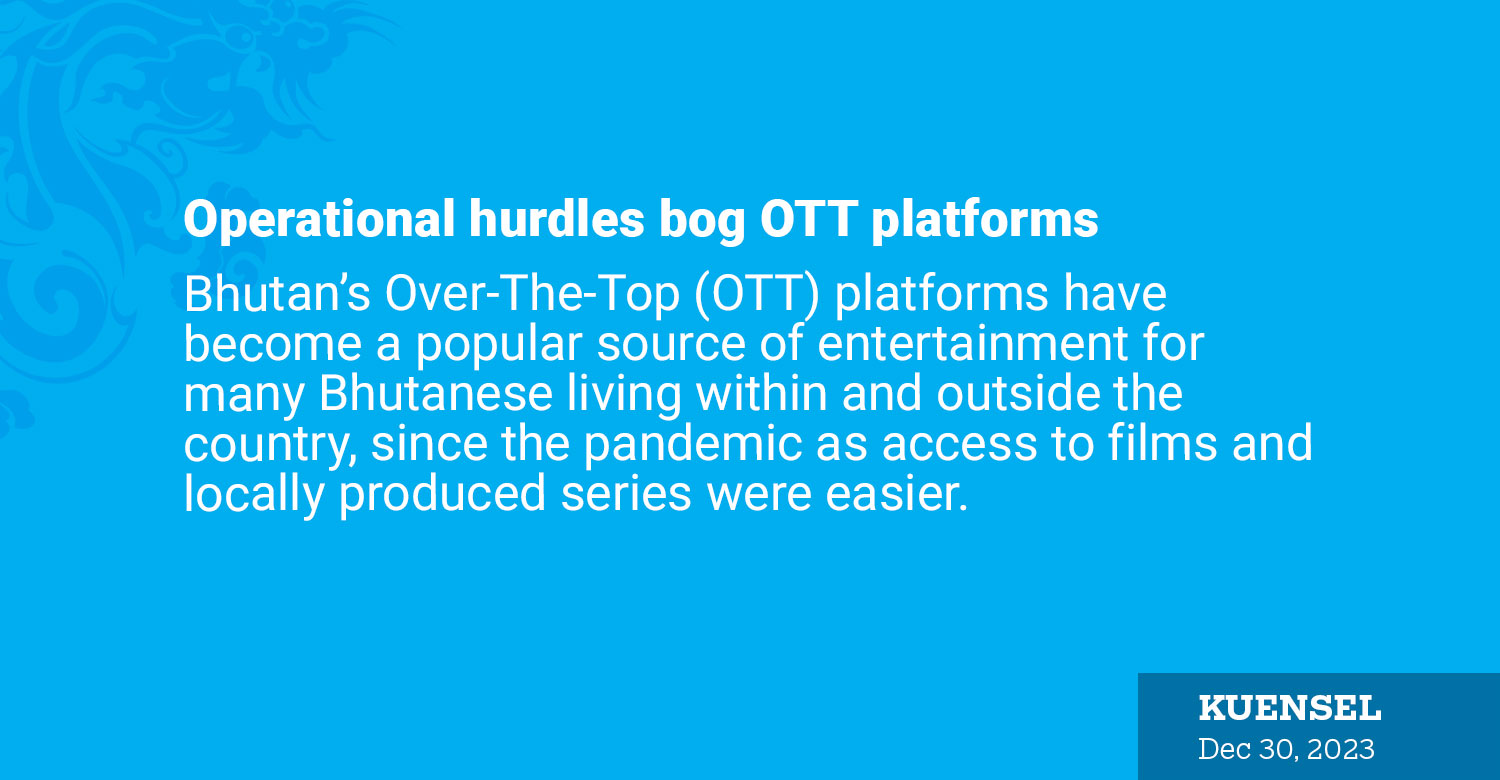
Bhutan’s Over-The-Top (OTT) platforms have become a popular source of entertainment for many Bhutanese living within and outside the country, since the pandemic as access to films and locally produced series were easier.
These fledgling platforms face multiple challenges while operating, threatening the sustainability of the OTT culture.
Samuh, the first OTT platform in the country, was not working in the past week because the server was being migrated from a third-party service provider based in Singapore.
Samuh’s CEO, Nyema Zam said that OTT platforms around the world generally depend on third-party service providers. “However, the main challenge in Bhutan is that we have to depend on several third-party service providers within and outside the country to provide our services to our users.”
She said that Samuh operates with the main infrastructure at its premises and uses international cloud servers and over 150 Content Delivery Network (CDN) servers around the world to deliver their services to users who reside in 184 countries.
“We are currently in the process of migrating our cloud and CDN servers. Due to the Christmas and New Year holidays, the migration process has taken longer than expected,” she said.
She said that within Bhutan, the key issue OTT platforms face is the lack of single platform integrations for payment gateways and OTP verification.
“It is because of this we have to integrate our platform with multiple service providers. For example, to provide mobile number OTP verification we have to integrate both Bhutan Telecom and TashiCell OTP services as the companies only offer on-net OTP services,” Nyema Zam said.
She said that as the providers do not provide international OTP verification services, Samuh has to integrate another International OTP service provider for international users.
“Additionally, as an OTT platform, we have to subscribe to several third-party services and software that require us to make recurring payments through credit cards. This is challenging when the USD credit card limits for corporate cards in Bhutan is a maximum of USD 5,000 a year,” she said.
Owing to the lack of reliable and efficient international payment gateways in Bhutan, Samuh has to depend on Google Pay and Apple Pay for international users and the gateways charge commissions of up to 30 percent per transaction.
The high cost and low quality of internet services in cities beyond Thimphu, Paro and Punakha has also affected the platforms. “This is one of the biggest barriers to digital streaming services within Bhutan.”
“We are currently working on providing on-demand or subscription-based nationwide local channel services in partnership with Multi Service Operators in the country to ensure our customers across the country can enjoy our content over Television without having to worry about internet cost or low internet speed,” she said.
“We will be offering the digital or linear TV version of the same channel over our platform and apps to users worldwide as well,” she said.
Another OTT platform, Shangreela, also faces challenges similar to Samuh, the Chief Technical Officer (CTO) told Kuensel.
“The limited payment systems and the integration of the payment gateways internationally are our problems. We have customers living abroad who prefer using their local bank accounts to pay but they face challenges in completing the payment because one-time-passwords (OTP) cannot be sent through SMS to international mobile numbers,” the CTO said.
The CTO said that a few more problems they face are the high cost of using cloud services and the payments for traffic for the CDN. “Our incurrence of high costs on cloud services and CDN charges are due to global inflation and appreciation in USD which we buy to make payments for international services.”
Another issue that the CTO pointed out is the lack of digital literacy among most of the potential customers.
The CTO said to tackle the issue, the reliability of the local payment gateway’s integration needs to be improved.
“Enabling the OTP to international numbers could help greatly. If the local payment gateway, which is facilitated by RMA, could work on integration with international payments systems and cards, people outside could subscribe to our services,” the CTO said.












